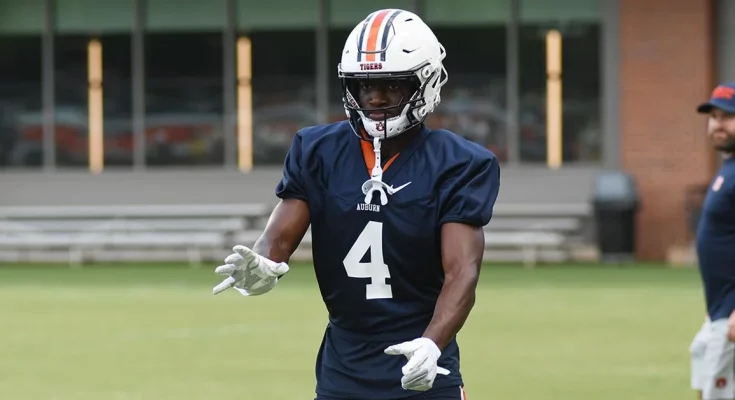Auburn Standout Malcolm Simmons Sees Legal Cloud Lift as Lee County Circuit Court Dismisses Domestic Assault Case, Cleared to Play
Auburn’s dynamic young wide receiver, Malcolm Simmons, has turned a page in both his personal and professional life after a legal battle that held the Auburn community—and college football fans—captive. On Monday, a Lee County, Alabama, Circuit Court dismissed the domestic assault case against Simmons, officially clearing him of wrongdoing and removing the threat that loomed over his budding football career. The decision brings a wave of relief to Simmons, the Tigers’ coaching staff, and a fan base eager to see his electrifying talent emerge in the 2025 season.
Simmons, just 20 years old, had been arrested on July 16 on a charge of domestic violence involving alleged strangulation or suffocation, after an altercation with his girlfriend; reports identified her as the mother of Simmons’s child. Lee County Sheriff’s Office records confirmed the arrest, and Simmons was booked into the Lee County Jail on a $20,000 bond. The ensuing headlines sparked intense scrutiny, both within the Auburn football program and among the wider college football community.
From the start, Auburn’s Athletics Department responded with a measured statement: “We are aware of the situation, are gathering the facts, and will address the situation”. Head coach Hugh Freeze added clarity on July 30 during a press briefing ahead of fall camp. He said the administration, informed of the developments, had cleared Simmons to participate in team activities. Only the preliminary hearing remained, initially set for August 13 and later moved up to August 8.
During that tense stretch, there were indications—though far from confirmatory—that Simmons had posted bail and regained his freedom. Observers noted his absence from the sheriff’s inmate database—a possible signal of his release while awaiting court proceedings . But with the hearing imminent, questions swirled about whether he’d return to the field fully, or face further legal obstacles.
Then, on Monday, came the turning point: several reports from multiple outlets confirmed that the case against Simmons had been dismissed in Lee County Circuit Court. WSFA reported that “Auburn Wide Receiver Malcom Simmons has been cleared of all wrongdoing … after his case was dismissed Monday”. This definitive legal outcome lifts a weight from Simmons’s shoulders and provides clarity not only for him, but for Auburn’s football season.
Freedom from legal jeopardy means Simmons is now fully available to compete for playing time without the overhang of criminal proceedings. Head coach Hugh Freeze had already permitted Simmons to join team activities, based on internal assessments, and this dismissal now cements that decision with legal backing .
For a receiver who made a splash as a true freshman—catching 40 passes for 451 yards and scoring three touchdowns—being dismissed from legal peril holds profound significance for his trajectory . His dynamism as a route runner and big-play threat made him one of the more exciting offensive weapons for Auburn in 2024. Coaches will likely lean on his speed and instincts as they finalize the 2025 game-day roster.
Beyond the gridiron, this dismissal signals a moment of personal vindication. Domestic violence allegations are among the most serious legal charges, carrying deep personal and societal ramifications. For Simmons, being exonerated means reclaiming not only his status as an athlete but also his dignity. It allows him to engage fully in team life and to build toward a successful future—perhaps even one beyond college.
Yet, the reaction within the Auburn program—while supportive—must also navigate the sensitive territory of public perception and institutional accountability. Coaches and administrators may use this moment as a teaching opportunity, reaffirming the university’s stance on personal conduct while also celebrating Simmons’s legal vindication. He has the chance to emerge as a role model for resilience—both on and off the field.
As for the upcoming season, Simmons’s return shapes offensive expectations significantly. Auburn opens its campaign on the road against Baylor on August 29, marking the start of a season that now may include a fully cleared and seasoned Simmons. If healthy and focused, he could spearhead the Tigers’ passing attack, helping to stretch defenses and open yet more opportunities for the receiving corps—already built around transfers and highly touted recruits .
In the locker room, teammates will welcome Simmons back—with understanding and support potentially stronger now than before. Trust, once fractured by uncertainty, may be renewed through solidarity as he reintegrates fully into the squad. And for Simmons himself, returning as an exonerated player can bring renewed confidence—a chance to let his game do the talking.
On a broader level, this case—and its dismissal—illustrates how quickly the narratives around college athletes can shift, and highlights the importance of due process. Fans, media, and institutions alike must balance the need for accountability with the recognition of legal outcomes and the presumption of innocence. In Simmons’s case, the legal system has ruled in his favor: his charges have been dropped, and his future restores itself not with fanfare, but through the dignity of cleared name and uninterrupted path toward goal and growth.
Ultimately, Malcolm Simmons’s story never was—or should have become—a cautionary tale. Instead, it is now one of redemption, resolve, and return. With the case behind him, he stands at the threshold of possibility. The upcoming season may test him athletically, but he steps onto the field with the weight of legal uncertainty lifted—and with the chance to define himself on his own terms once again.



